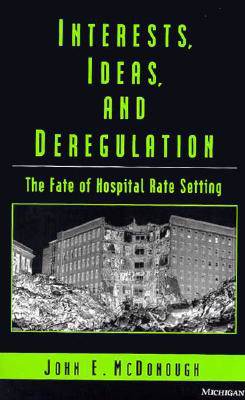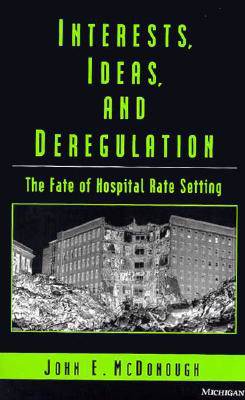
- Retrait gratuit dans votre magasin Club
- 7.000.000 titres dans notre catalogue
- Payer en toute sécurité
- Toujours un magasin près de chez vous
- Retrait gratuit dans votre magasin Club
- 7.000.0000 titres dans notre catalogue
- Payer en toute sécurité
- Toujours un magasin près de chez vous
Interests, Ideas, and Deregulation
The Fate of Hospital Rate Setting
John E McDonough
Livre relié | Anglais
144,45 €
+ 288 points
Description
This work studies the effectiveness of hospital rate setting as a mechanism for cost containment and details the economic and political factors leading to its demise in three of the four states examined. John E. McDonough brings his prior experience as Chair of the Health Care and Insurance Committees for the Massachusetts House of Representatives as well as a methodologically sound presentation to this topic. McDonough's unique vantage point serves as a clear asset in dissecting the events and lending perspective to the policymaking process.
Which matters more in crafting public policy--the blunt force of interest groups and lobbyists or the development of new ideas that make a difference? Are elected officials leaders or followers in promoting policy change? McDonough answers these questions in the context of the complex world of health care and uses the thirty-year history of hospital rate setting as an example.
The states covered in this volume are Massachusetts, New Jersey, New York, and Maryland. Characteristics of the subject states are provided in great detail along with case histories of rate setting in each. The book discusses the role of interest groups and policy ideas examining two rival models: The theory of economic regulation and the punctuated equilibrium model of policy change.
Policymakers and administrators will be interested in how this work follows theory into practice and provides assistance in identifying obstacles in the creation and implementation of policy. Political scientists will be interested in its use of the punctuated equilibrium model of policy change, and economists concerned with the theory of economic regulation will be drawn to the discussion of it in the health care context.
John E. McDonough is a Massachusetts State Representative, former Chair of the Health Care and Insurance Committees for that body, and Adjunct Professor of Health Policy, Boston University School of Medicine.
Which matters more in crafting public policy--the blunt force of interest groups and lobbyists or the development of new ideas that make a difference? Are elected officials leaders or followers in promoting policy change? McDonough answers these questions in the context of the complex world of health care and uses the thirty-year history of hospital rate setting as an example.
The states covered in this volume are Massachusetts, New Jersey, New York, and Maryland. Characteristics of the subject states are provided in great detail along with case histories of rate setting in each. The book discusses the role of interest groups and policy ideas examining two rival models: The theory of economic regulation and the punctuated equilibrium model of policy change.
Policymakers and administrators will be interested in how this work follows theory into practice and provides assistance in identifying obstacles in the creation and implementation of policy. Political scientists will be interested in its use of the punctuated equilibrium model of policy change, and economists concerned with the theory of economic regulation will be drawn to the discussion of it in the health care context.
John E. McDonough is a Massachusetts State Representative, former Chair of the Health Care and Insurance Committees for that body, and Adjunct Professor of Health Policy, Boston University School of Medicine.
Spécifications
Parties prenantes
- Auteur(s) :
- Editeur:
Contenu
- Nombre de pages :
- 296
- Langue:
- Anglais
Caractéristiques
- EAN:
- 9780472108886
- Date de parution :
- 19-12-97
- Format:
- Livre relié
- Format numérique:
- Genaaid
- Dimensions :
- 161 mm x 236 mm
- Poids :
- 675 g

Les avis
Nous publions uniquement les avis qui respectent les conditions requises. Consultez nos conditions pour les avis.






